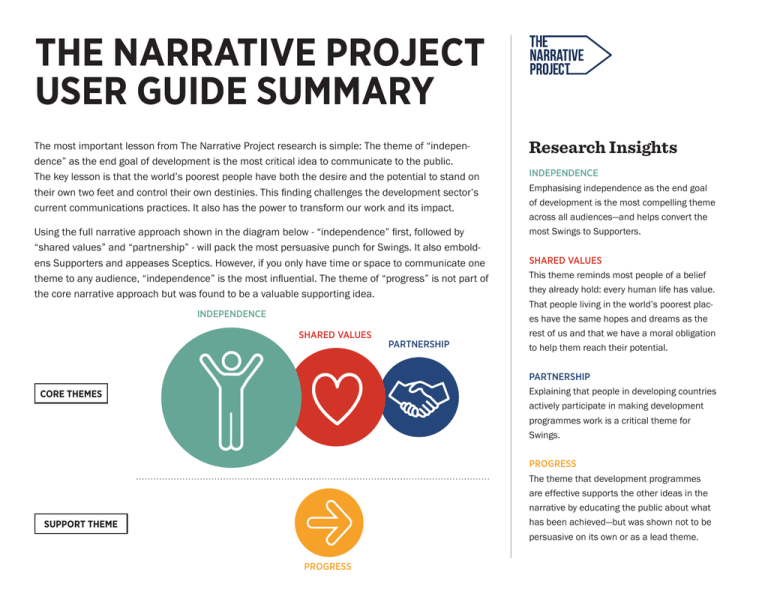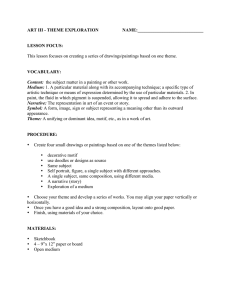Narrative Project
advertisement

THE NARRATIVE PROJECT USER GUIDE SUMMARY The most important lesson from The Narrative Project research is simple: The theme of “independence” as the end goal of development is the most critical idea to communicate to the public. The key lesson is that the world’s poorest people have both the desire and the potential to stand on their own two feet and control their own destinies. This finding challenges the development sector’s current communications practices. It also has the power to transform our work and its impact. Using the full narrative approach shown in the diagram below - “independence” first, followed by “shared values” and “partnership” - will pack the most persuasive punch for Swings. It also emboldens Supporters and appeases Sceptics. However, if you only have time or space to communicate one theme to any audience, “independence” is the most influential. The theme of “progress” is not part of the core narrative approach but was found to be a valuable supporting idea. INDEPENDENCE SHARED VALUES PARTNERSHIP Research Insights INDEPENDENCE Emphasising independence as the end goal of development is the most compelling theme across all audiences—and helps convert the most Swings to Supporters. SHARED VALUES This theme reminds most people of a belief they already hold: every human life has value. That people living in the world’s poorest places have the same hopes and dreams as the rest of us and that we have a moral obligation to help them reach their potential. PARTNERSHIP Explaining that people in developing countries actively participate in making development programmes work is a critical theme for Swings. CORE THEMES PROGRESS The theme that development programmes are effective supports the other ideas in the narrative by educating the public about what has been achieved—but was shown not to be persuasive on its own or as a lead theme. SUPPORT THEME i PROGRESS LANGUAGE TIPS: GENERAL LANGUAGE NARRATIVE THEME EXPLANATION Development “Development” can be a vague word for people who aren’t experts in the field, but in general the term carries positive meanings. “Foreign aid” has strongly negative connotations for our audience. Independent In research with UK audiences, this was the favoured word to describe the goal of development. “Self-sufficient” and “ending dependency” also work. People in the world’s poorest places This avoids stigmatising people by associating “poor” with their circumstances, rather than the people themselves. Stand on their own two feet This is a metaphor that brings to life both the goal and the potential that everyone has within them. Education, health and economic opportunity These terms refer to specific types of development programmes that most people understand and value. You can provide other examples, too. Deserve the same chances and opportunities, level playing field These phrases address the idea of equity in familiar terms that our audience can relate to. Opportunity, dignity, full potential, pride These words express values and beliefs shared by our audience and by people who benefit from development programmes. Sharing, co-operation These words and phrases make the idea of partnership come alive. Knowledge, resources and responsibility These examples make it clear that people who benefit from development programmes contribute something valuable to the work. Working, prevent, disappearing, improve These action verbs and concise statements convey confidence in the idea that progress is being made. Narrative Messages INDEPENDENCE Development programmes help people in the world’s poorest places become independent and stand on their own two feet. SHARED VALUES People born in the world’s poorest places deserve the chance to achieve their full potential, because every human life is valuable. PARTNERSHIP Development programmes work because people from across countries and communities join forces to share knowledge, resources and responsibility. PROGRESS Development programmes work. We’ve beaten smallpox, nearly defeated polio and helped millions of people get education and training. ii CONTENT CREATOR’S CHECKLIST Use the guidelines below to successfully apply The Narrative Project approach to your communications. CORE THEMES INDEPENDENCE SHARED VALUES Lead with “building independence” as the purpose of development programmes. Describe people in terms of their hopes and values in order to create empathy. Emphasise independence instead of invoking pity. Highlight feelings that all people can relate to. SUPPORT THEME PARTNERSHIP Focus on partnership in all aspects of development programmes and how each player actively contributes. Use examples and metaphors to help your audience picture how people and countries work together. PROGRESS Don’t lead with progress. Provide examples of progress as supporting information, after the other themes in the narrative. Examples of success and change are important elements for convincing Swings. Present problems as preventable and solvable to show that progress is possible. Use simple, clear language and specific examples to assert what has been accomplished. Help people understand how their actions lead to change, in order to make progress feel more believable. iii
